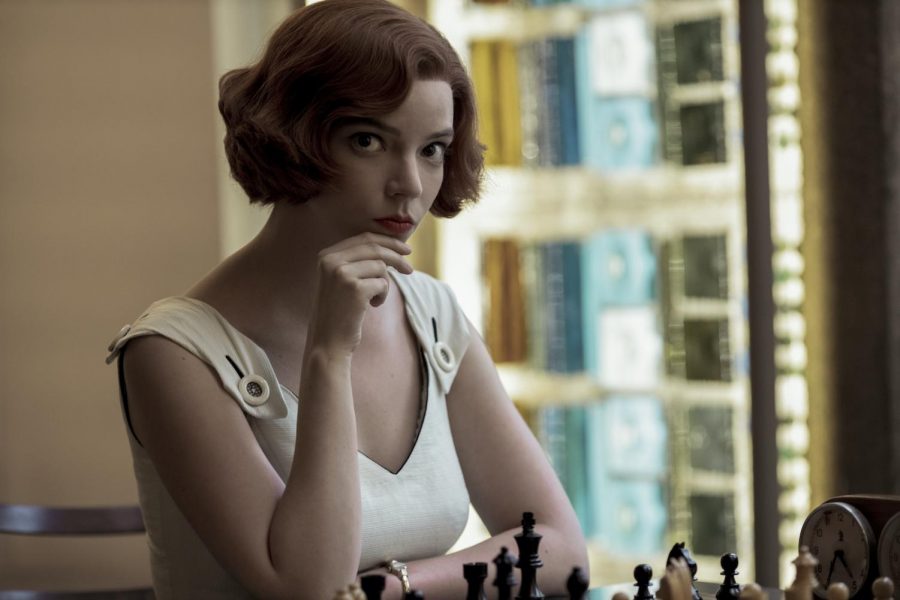“The Queen’s Gambit” proves the future of movies is TV, and I’m okay with it
Anya Taylor-Joy dominates as Beth Harmon, a fictionalized female version of chess grandmaster Bobby Fischer, in the new series “The Queen’s Gambit.”
When you think of what differentiates a film from a TV show, the defining aspect of film is usually the singular cohesive story and stylings that TV shows usually lack. There is a limited nature to film, as films usually range between one to three hours total and have a singular creative team of a director and a screenwriter or two. Television shows, on the other hand, usually have a showrunner that oversees the entire vision, but with the episodic nature of release and the amount of content in a single season, multitudes of directors and writers are involved. For example, the fourth season of everybody’s favorite background sitcom, “Friends,” had one showrunner, nine directors and eighteen writers.
However, now we are in a renaissance of TV content, spurred by an influx of creator-driven shows, such as “The Sopranos,” “Avatar: The Last Airbender,” “Breaking Bad” and “Game of Thrones,” with much more of a singular vision behind the entire project. The rise of streaming services, as well, has driven an oil rush for shows with each service trying to get as much content as possible. Saturday Night Live skits have even been made on how many shows Netflix and the like have been approving, seemingly to appeal to every taste. These factors have all combined to create a whole new generation of prestige television, enabling shows to have the creativity and proper storytelling that mainstream films have been lacking in recent years. While the highest grossing movies have developed into a never-ending cascade of intellectual property-driven, nostalgia-laden blockbusters––with creator-driven prestige films floundering––the most popular TV shows remain refreshingly original.
And now, with Netflix’s new limited miniseries, “The Queen’s Gambit,” it is as evident as ever that the future of original films is television. With each episode written and directed by series creator Scott Frank, the seven episode series takes the consistency and limited story structure that films best foster and gives it all room to breathe. Limited miniseries aren’t new: Series like “Chernobyl,” “Watchmen” and “Band of Brothers” have been driving the format forward in recent years while older series such as 1977’s “Roots” have garnered acclaim for decades. However, “The Queen’s Gambit” is further proof of how every genre of film is slowly moving to miniseries.
“The Queen’s Gambit” is a drama about fictional chess grandmaster Beth Harmon (Anya Taylor-Joy) and her rise in the field. From being an orphan playing chess in the basement of her orphanage, to challenging the world champion, she also deals with her childhood trauma and dependence on drugs and alcohol. Set in the 1960s, the series is a period piece filled with beautiful sets and wardrobes, steeped in Cold War intrigue, while also being a sports drama. Underdog Beth rises up the ranks, first failing to defeat the U.S. champion before eventually prevailing, then going to the Soviet Union to beat the top chess player there after being trained by her former rival.
Yes, here chess is presented with all the excitement and beats of a sports drama, with each match intricately paced. The show has the confidence to never explain how chess actually works but presents it in such a way to the audience that it is nonetheless engaging. But the series is more than just a sports drama, remaining more-focused on Beth’s character development. Her trials and tribulations define the series, along with her inability to form healthy relationships, which causes the audience to sympathize with her plight yet also wish she could find a better way forward. Her drive and determination towards the top is relentless but coupled with extremely negative coping mechanisms, allowing the series to do a character deep-dive.
“The Queen’s Gambit” explores the development of female desire and obsession, while also maintaining the mass appeal of a sports drama.
Following Beth through an extended flashback before facing a Soviet champion seemingly hungover, the series follows through Beth’s childhood to teenage years in almost Dickensian fare as she learns chess from the orphanage janitor, Mr. Shaibel (Bill Camp), attempts to cope with her tranquilizer addiction alongside her orphan friend Jolene (Moses Ingram), and is then adopted by alcoholic Mrs. Alma Wheatley (Marielle Heller), whose strained marriage is exasperating her depression. Through it all, Beth shines due to Taylor-Joy’s performance as the precocious––yet charmingly destructive––chess prodigy.
The extra room of a mini-series gives “Gambit” the ability to deal with all these topics while also giving enough time for all the series’ best characters to shine. It’s no wonder that more and more creators are being drawn to the format. While it is too early to eulogize the theatrical film, the flexibility and platform allowed by streaming services has only led to more great content being released and having a cultural impact. Visual storytelling isn’t going anywhere, but the form it takes will constantly evolve. Let’s not forget that the entire medium is only a century old. Where it goes from here is up in the air, especially with theaters being shut down for an extended period of time and streaming services taking more of a prominent place in society. For now, though, let us all just enjoy the quality content we are getting out of all this.
In the case of “The Queen’s Gambit,” come for the chess drama, stay for Beth Harmon’s journey of looking great, being destructive and humiliating men all around the world. Needless to say, if the future of visual media allows more series like this, I am more than comfortable with it.

Shreyas (he/him) is a fourth-year student majoring in biology and philosophy. If he isn't yammering to you about how great "Pet Sounds" is or making bad...


